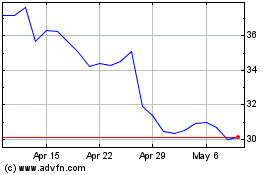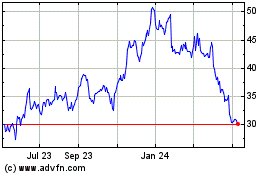Intel Deal for Mobileye Fuels Israel's Drive to Become Automotive Tech Hub
March 14 2017 - 2:49PM
Dow Jones News
By Rory Jones
TEL AVIV -- Israeli startups have new incentive to hit the gas
in a race to develop the next big vehicle-automation
technology.
Intel Corp.'s $15 billion acquisition of Jerusalem-based
Mobileye NV -- the biggest technology deal in the so-called Startup
Nation -- has raised hopes that Israel can produce companies that
may attract massive investments from multinationals.
"It shows that we can build big companies that sell with
11-figure numbers," said Ben Volkow, the founder of Otomono, a data
company that helps car firms gather information from connected
vehicles.
From cybersecurity to artificial intelligence, Israeli
entrepreneurs have turned this Mediterranean country into a global
innovation hub. Now they are disrupting almost every element of the
car manufacturing chain, using local expertise to create
cutting-edge technologies in everything from combustion engines to
quick-charge batteries.
The country has come to occupy a prominent position in the
global automotive supply chain despite not having much of an auto
industry at home.
Mobileye -- known globally for its chip-based camera systems
that power automated driving features -- has said its operations
and roughly 600 employees will remain in Israel.
"This [Intel] deal will be looked at as the new phase for the
industry," Eran Shir, chief executive of Israeli startup Nexar
Ltd., said of the Mobileye buyout. "Data is now the new oil."
Intel's investment is expected to further spur development of
Israel as an automotive hub, with more than a hundred Israeli firms
already working in this space.
Mr. Volkow's Otonomo, for instance, is focused on the data
collected by cars. His platform takes hundreds of parameters that
new connected cars communicate to manufacturers in real time --
tire pressure, driving habits and what is on the radio -- and sells
the data to third parties such as insurance companies, retailers
and maintenance firms to boost car manufacturers' margins.
The Israeli firm is working with eight car manufacturers,
including Daimler AG, and aims to become a marketplace like Apple'
Inc.'s iTunes for car data.
The Nexar app is attempting to make motorists more accountable,
with just a smartphone and a dashboard holder. It uses cameras and
sensors in the smartphone to create a network of phones that
monitors cars and drivers.
The app warns individuals about potential hazards one or more
cars ahead and can reconstruct collisions for insurance claims. The
app is being piloted with professional drivers that work with
ride-hailing apps such as Uber Technologies Inc.
About 400 Israeli companies and entrepreneurs in the
transportation and automotive sector have raised roughly $4 billion
from investors in four years, according to EcoMotion, a
nongovernmental organization set up in partnership with the Israeli
Prime Minister's Office and Economy Ministry.
The figure includes an initial public offering from Mobileye and
Volkswagen AG's purchase of a $300 million stake in Israeli taxi
app Gett last year. Israeli-founded ride-hailing app Via
Transportation Inc. raised $100 million last year. And Ford Motor
Co. purchased an Israeli machine-learning company last year for an
undisclosed sum. Fast-charge battery company Storedot Ltd. raised
$18 million in 2015 to power electric cars.
"We believe the auto industry is being transformed," said
Emanuel Timor, a partner at Vertex Ventures, which originally
bought a stake in Israeli mapping firm Waze, purchased by Google in
2013 for $1 billion. "There's a great opportunity for
startups."
The country's expertise in cybersecurity is providing one such
opportunity.
Young Israelis trained by its defense forces in
cyberintelligence have gone on to establish some of Israel's
biggest tech firms. They also are creating security products to
ensure cars aren't easily hacked.
"If there's a defined problem, Israeli startups are focused on
solving that problem and monetizing it," said Ian Simmons, vice
president of business development at Canadian parts supplier Magna
International Inc. in a recent interview. It invested in Tel
Aviv-based startup Argus Cybersecurity Ltd in 2015.
Write to Rory Jones at rory.jones@wsj.com
(END) Dow Jones Newswires
March 14, 2017 14:34 ET (18:34 GMT)
Copyright (c) 2017 Dow Jones & Company, Inc.
Intel (NASDAQ:INTC)
Historical Stock Chart
From Mar 2024 to Apr 2024

Intel (NASDAQ:INTC)
Historical Stock Chart
From Apr 2023 to Apr 2024
